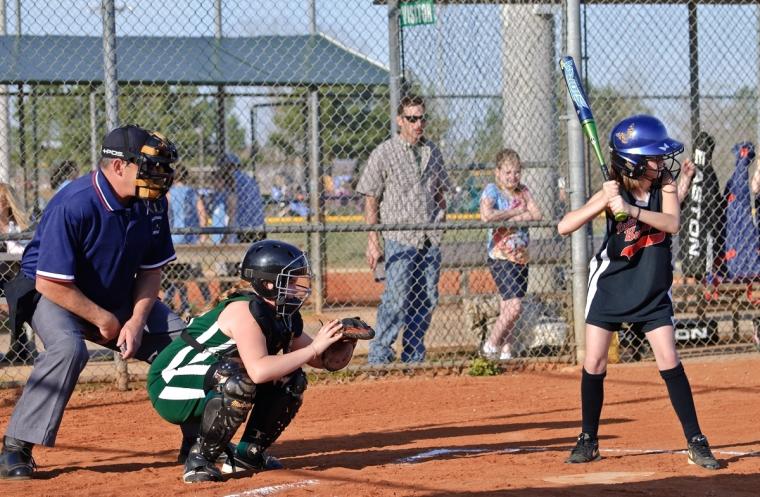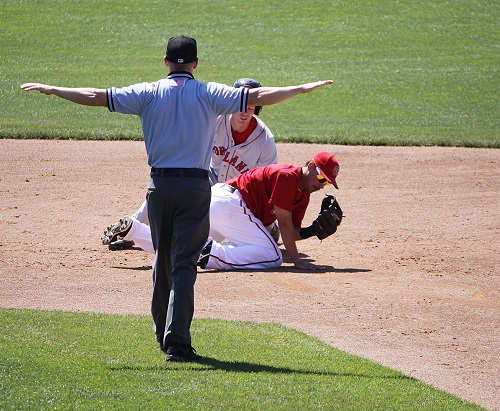
A New Jersey Little League organization is giving new meaning to “walk a mile in someone else’s shoes.” Only this time, the walking is replaced with standing — behind the batter’s box to call balls and strikes in front of a jury of parental peers.
That’s right: Any parent or other spectator who harasses the (volunteer) umpires will have “to don the mask … and do the job at three upcoming games, or else you can’t continue to attend as a fan,” according to PhillyVoice.com.
“[Parents] think that the call was bad, which always amazes me that they can see a strike better over there than the umpire can,” Deptford Township Little League President Dan Bozzuffi told 6abc.com, adding that two league umps recently quit in one week. “They’re coming here, they’re being abused, they don’t need that. So they’re walking away.”
Bozzuffi says the new rule will allow parents who think they know best “to see what’s going on out here, and it’s not that easy.” He told another news outlet he wants to see disruptive parents “squirm.”
No word yet on how many fans (if any) have been forced into service behind the plate, but Bozzuffi emphasizes that a certified umpire will be with them — to ensure correct calls.
“If the parents are going to be sitting there yelling the whole entire game, they might as well use that energy out on the field,” one mother told 6abc.com.
Unfortunately, verbal — and sometimes physical — abuse of game officials is nothing new in youth sports. And that goes a long way to explain (along with COVID-19) the shortage of officials at the youth and high school levels all over the country.
 “This is a nightmare across all sports,” Dana Pappas, director of officiating services for the National Federation of State High School Associations (NFHS), told The New York Times last year.
“This is a nightmare across all sports,” Dana Pappas, director of officiating services for the National Federation of State High School Associations (NFHS), told The New York Times last year.
NFHS held its second Officials Consortium in Indianapolis in January, which was attended by representatives of state high school sports associations, athletic administrators, facility directors and other stakeholders to discuss “best practices for cleaning up the sport environment, recruiting and retaining officials and providing an improved atmosphere for all participants in an athletic contest,” according to Pappas.
“The challenge of finding and maintaining a sufficient cadre of eligible officials in each of our sports and activities is real,” said Erich Martens, executive director of the Minnesota State High School League, who attended the three-day gathering. (Minnesota is one of several states that have become more aggressive and proactive in recruiting, training and supporting officials.) “We need everyone — all student participants, coaches, administrators, media and fans — to support our officials, treat them with respect and demonstrate appreciation for their service.”
“The New Jersey State Interscholastic Athletic Association (NJSIAA) — which governs all state high school athletics and registers officials for game participation — revealed that the number of officials in New Jersey has dropped from 8,500 in 2019 to 7,300 today,” reports the Asbury Park Press. “About 50,000 high school officials, roughly 20%, have resigned nationwide during that same time period.”
“It has become an extremely difficult job regardless of the sport — from soccer to baseball to football and basketball,” Ted Gillen, a former coach at Toms River East High School in New Jersey and now athletic director at Toms River Regional Schools, told the newspaper. “A lot of people get into it for the love of the game but find that the treatment from coaches and crowds and parents at the end of the day is not worth the money and the stress.”
In 2020, 57% of the nearly 17,500 officials surveyed by the National Association of Sports Officials agreed that “sportsmanship is getting worse,” compared to fewer than 16% who believe it’s getting better. What’s more, between 11% and 19% of officials admit to having — as a fan — heckled or publicly criticized fellow officials.
Additionally, 36% of survey respondents noted that the level at which sportsmanship is the worst is youth competitive sports, with parents causing the most problems.
Also in 2020, OfficiallyHuman.com, a website dedicated to “restoring respect to game officials,” revealed that 55% of nearly 19,000 sports officials surveyed from 15 states indicated verbal abuse from fans, coaches and parents is the top reason they stop working games. Almost 60% said they don’t feel respected by parents and fans, and 42% feel that organizations do not address poor fan behavior during games.
Which makes the drastic steps Deptford Township Little League is taking even more remarkable. Will that organization set a precedent that other youth sports leagues and even high schools will follow?

